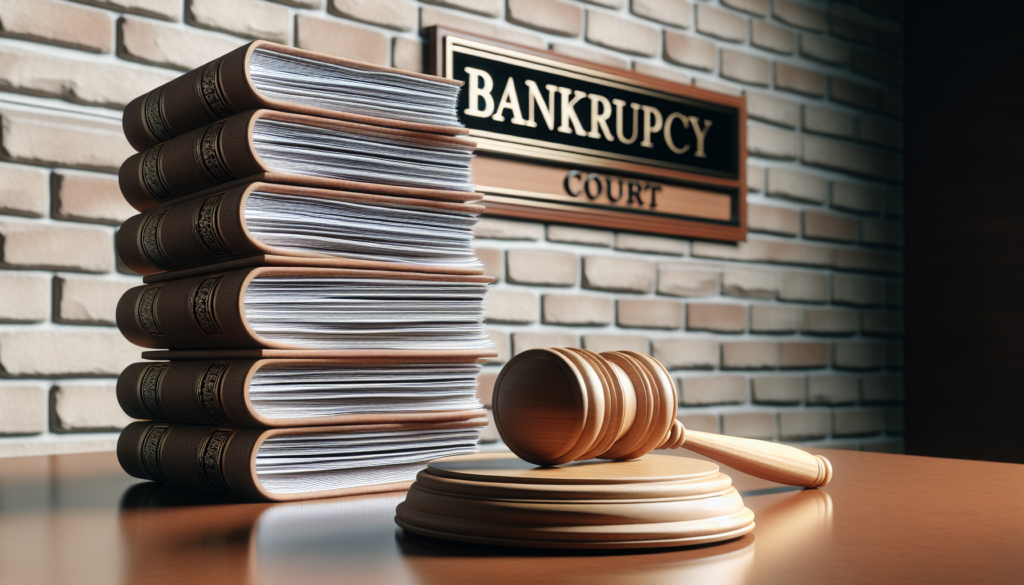
Embarking on the journey toward reclaiming your financial stability requires a legal expert who can navigate the intricacies of insolvency proceedings. The choice of an adept insolvency counsel is pivotal in transforming an overwhelming debt burden into a manageable financial restructure.
Such a lawyer is not just a necessity for paperwork; they are instrumental in formulating a repayment schedule that aligns with your fiscal abilities while complying with legal requirements.
In the realm of personal bankruptcy, securing proficient legal assistance is indispensable for those seeking relief under the Wage Earner’s Plan, also known as Chapter.
A lawyer with a specialized focus on Chapter 13 is critical to developing a court-sanctioned strategy for debt reorganization, allowing you to retain assets while systematically reducing liabilities. Understanding debt reorganization can be complex, but with the assistance of a personal bankruptcy attorney, wage earners plan, insolvency counsel, and repayment schedule advisory, individuals can navigate the process of financial restructure effectively.
Click here to learn more about: file7file3.com
Choosing a Personal Bankruptcy Attorney
Embarking on the journey towards legal debt relief requires a trusted advisor equipped with the knowledge to navigate the complexities of the law. This journey begins with recognizing the pivotal role a bankruptcy court advocate will play in your financial restructuring under Chapter.
More than just a legal advisor, their expertise is crucial not only for reorganizing your debts but also for guiding you through an intricate legal journey.
Selecting a legal representative steeped in experience and with a record of proven results is essential for your success.
Assessing an attorney’s success rate with Chapter 13 filings and their ability to communicate clearly offers a glimpse into how effectively they may handle your case. A track record of client satisfaction can be another reliable indicator of their skills in trustee negotiations and their potential to secure your financial future.
Understanding the intricacies of your case begins with your first interaction during the initial consultation. This is where expertise in legal debt relief, advocacy in bankruptcy court, trustee negotiations, asset protection strategy, means test consulting, and debt consolidation services becomes invaluable.
Understanding Wage Earners Plan
For individuals with steady earnings who face overwhelming debt, Chapter 13 Bankruptcy offers a viable route towards financial stability. This legal provision provides a systematic approach for debtors to retain their property while repaying creditors under a court-approved plan.
This process is especially distinct from Chapter 7, where debt liquidation is the primary method to settle debts.
In the structured environment of Chapter 13, a petitioner employs petition preparation expertise to devise a repayment scheme to creditors, which typically spans a period of three to five years.
To qualify for this type of financial reorganization, one must meet the definition of a wage earner, indicative of having consistent income. The plan’s design also calls for careful consideration of debt limitations that cap the permissible debt amounts under Chapter 13 statutes. An important criterion in this financial recovery journey is proving that one has enough income to fulfill the obligations laid out in the plan created in consultation with experts in automatic stay guidance, creditor meeting strategy, petition preparation expertise, secured debt management, unsecured liability solutions, and consumer debt representation.
Key Aspects of Chapter 13 Bankruptcy
- Chapter 13 allows debtors to keep their property while repaying debts over three to five years.
- Debtors must have a regular income to qualify as wage earners for Chapter 13 proceedings.
- There are specific debt limitations in place that determine eligibility for filing under Chapter
- A successful Chapter 13 plan requires sufficient income to cover the repayment obligations.
Insolvency Counsel Evaluation
Navigating the complex terrain of financial recovery starts with choosing an expert who can guide you through the legal intricacies. An attorney skilled in bankruptcy risk analysis is essential for those facing the daunting task of declaring insolvency.
This crucial first step requires dissecting the role of a potential legal advisor and their ability to navigate the nuances of protection laws and creditor negotiations.
Mastery of the primary duties and understanding legal limitations is indispensable for any professional in this field.
An attorney’s deep knowledge of the nuanced debt-relief frameworks is a fundamental asset for anyone providing insolvency aid. The legal frameworks not only influence the range of actions that counsels can execute but also shape the strategic advice they impart to clients.
A practiced bankruptcy statute advisor should possess the finesse to customize exemption advice, ensuring it aligns accurately with each individual’s fiscal landscape, considering an array of personal and financial factors.
Repayment Schedule Advisory Role
Navigating the complex terrain of financial liabilities, an attorney’s expertise is instrumental in creating a robust strategy for debt resolution. Understanding the Legal Framework requires meticulous examination of bankruptcy laws, setting the boundaries within which a debtor must operate.
Legal advisors meticulously parse these regulations to guarantee that debt adjustment expert guidance is consistent with prevailing legal benchmarks.
The Role of Legal Counsel in Repayment Planning is grounded in a comprehensive analysis of the debtor’s fiscal situation, culminating in the judicious formulation of a repayment blueprint.
Lawyers prioritize obligations, weaving in priority claim management, and dispense tactical recommendations on juggling monetary commitments in line with legal prescriptions. Their counsel is pivotal in devising a viable schedule that satisfies credit counseling compliance demands.
Analyzing Repayment Options and Scenarios encompasses a critical appraisal of various repayment frameworks and their respective legal implications. Attorneys conduct thorough evaluations, contemplating each angle to ensure priority claim management, effective foreclosure legal defense, strategic discharge planning, skilled debt adjustment, stringent credit counseling compliance, and a comprehensive understanding of filing procedures are all meticulously addressed.
Asset Protection Strategy Discussion
Navigating the complexities of financial restructuring, individuals facing insolvency often turn to seasoned professionals. Securing the assistance of a legal expert in the process of Chapter 13 bankruptcy is a critical step in protecting your finances and holdings.
These attorneys play a pivotal role in helping clients make informed decisions about long-term financial planning, leveraging their knowledge to maximize asset exemptions and guide debtors through the intricacies of this legal process.
Engaging a Lawyer for Chapter 13 Bankruptcy
When you find yourself wading through the waters of Chapter 13 bankruptcy, a lawyer’s guidance becomes indispensable for safeguarding your property and investments.
Not only do they provide crucial insights into estate administrative law, but they can also help you distinguish the significant differences between Chapter 13 and the more liquidative Chapter 7 bankruptcy, having a direct impact on how you retain your assets. Given the complexity of long-term financial planning and the intricacies of creditor’s legal rights, obtaining pro bono support can be invaluable for understanding co-debtor information and navigating estate administrative law and insolvency filing procedures.
Attorney Fee Structure Transparency
Understanding the financial implications of securing legal assistance is critical for clients embarking on any legal proceeding. This detailed exploration will confirm the complexities involved with the variable expenses associated with legal representation.
We will clarify common fee arrangements including hourly rates, flat fees, retainer fees, and contingency fees, highlighting the importance of comprehending these payment models before entering into a legal agreement.
Clear communication between a legal professional and their client regarding fee expectations is essential for establishing a transparent financial relationship.
It is imperative that all terms of payment are clearly outlined in a written agreement. We will provide practical advice to help clients effectively discuss the subject of fees with their legal counsel.
In matters of Bankruptcy, grasping the fiscal responsibilities involved is particularly vital. This segment will cover the lawyer’s fees alongside a thorough Qualification Assessment, ensuring that individuals understand the various eligibility requirements. By focusing on alternative solutions and integrating repayment strategy design, distress support, qualification assessment, eligibility requirements, and recovery legal services, we can provide comprehensive assistance for those in need.
Qualification Assessment Assistance
Understanding the Requirements for Chapter 13 Bankruptcy
Embarking on the journey of financial restructuring under Chapter 13 starts with a thorough grasp of the legal qualifications necessary to proceed. Recognizing the importance of these prerequisites is essential before beginning your filing, as it plays a vital role in the eventual success of your bankruptcy case.
Assessing Your Financial Position and the Means Test
Assessing whether you meet the Means Test Instruction is a critical initial step in determining Chapter 13 suitability.
A detailed examination of your monthly income is compared against the median for your state, a procedure integral to any pre-filing strategy.
It’s equally vital to accurately calculate your disposable income to gauge your repayment plan’s feasibility. Being mindful of Chapter 13’s stipulated debt, it is crucial to engage with expertise in Post-Petition Debt Handling, adopt a thoughtful Pre-Filing Strategy, seek out Debt Relief Consultancy, comprehend Means Test Instruction, consider Plan Modification Analysis, and obtain Non-Dischargeable Debt Advice.
Non-Dischargeable Debt Advice
When facing financial obligations that persist even after declaring Chapter 13 bankruptcy, it’s imperative to craft a meticulous Exemption Strategy to navigate the intricacies of such enduring debts.
Understanding Nondischargeable Debts
Certain financial responsibilities are immune to the usual relief that comes with bankruptcy; they linger even after other debts have been settled or restructured.
These include familial support payments like alimony and child support, particular tax liabilities, and penalties from legal infractions.
Grasping the scope and limitations of these obligations provides a solid foundation for their management.
Strategies for Tackling Nondischargeable Debts
Creating an effective Exemption Strategy for handling these stubborn debts is essential. It requires careful financial planning, ensuring that debt repayment remains a priority without compromising crucial living costs. By initiating a Reaffirmation Agreement Guidance, debtors can navigate the insolvency process with a clearer understanding of exemption strategies, discharge eligibility, income-based solutions, and the implications of voluntary filing decisions.
Key Points on Managing Nondischargeable Debts
- Alimony and child support are examples of debts that cannot be discharged in bankruptcy.
- Certain tax liabilities remain the responsibility of the debtor even after filing for Chapter 13 bankruptcy.
- Legal penalties and fines are generally not eliminated through the bankruptcy process.
- An Exemption Strategy is crucial for addressing debts that are not relieved by bankruptcy filing.
Debt Relief Legal Support for Securing a Competent Bankruptcy Lawyer
Chapter 7 Bankruptcy Advice to Find the Right Lawyer for Your Case




Get a Free Bankruptcy Case Evaluation